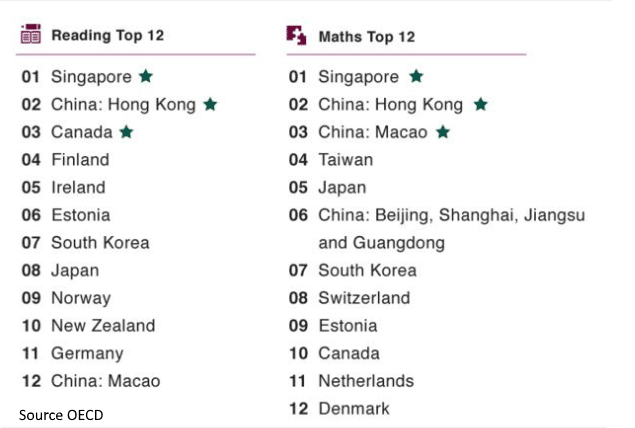
US Education System on par with garbage
Updated Sept 2023
Today’s education is on par with garbage; you enter the institute sane and walk out insane. Much like a factory, the current education system churns out students who often lack critical thinking skills. The emphasis is on rote learning and regurgitation of facts rather than fostering creativity, innovation, and independent thought. This is akin to programming a robot, where the output is predictable and lacks originality. The system is designed to produce obedient workers rather than innovative thinkers, which is a disservice to the potential of human intellect.
The Impact of Social Media and Reality TV
With algorithms designed to keep users engaged, social media platforms often prioritize sensational content over educational or thought-provoking material. This leads to a cycle where users are constantly exposed to and consume content that does not contribute to their intellectual growth. Instead, it fosters a culture of instant gratification, where likes and shares become the measure of success and self-worth.
Reality TV, on the other hand, presents a distorted view of reality that is often far removed from the average person’s experiences. Shows like The Kardashians glamorize a lifestyle of excess and superficiality, creating unrealistic expectations and standards. The popularity of such shows indicates a shift in societal values, where material wealth and fame are prized over intellectual pursuits and personal growth.
The impact of this trend is far-reaching. It affects how we perceive ourselves and others, our aspirations, and our understanding of the world. It fosters a culture of superficiality and instant gratification, undermining critical thinking and intellectual curiosity. This is a worrying trend that needs to be addressed, as it has significant implications for the future of our society.
The role of education and media literacy in mitigating this issue cannot be overstated. By promoting critical thinking and media literacy, we can equip individuals with the tools to navigate the digital landscape responsibly and discerningly.
The Role of Corporations
Corporations have been leveraging the Internet to influence public opinion and consumer behaviour. This is done through various methods, such as targeted advertising, content marketing, and social media campaigns. These strategies are designed to shape consumer preferences, buying habits, and even political and social views.
Targeted advertising, for instance, uses data collected from users’ online activities to create personalized ads. This can influence consumers to buy certain products or services and shape their perceptions of a brand or company.
Conversely, content marketing involves creating and sharing online material (such as videos, blogs, and social media posts) that does not explicitly promote a brand but is intended to stimulate interest in its products or services. This can subtly influence consumers’ attitudes and behaviours.
Social media campaigns can also be used to sway public opinion. Corporations can use these platforms to spread messages, create narratives, and engage with consumers. This can be particularly influential in shaping political opinions and societal norms, as seen in various instances around the world.
However, it’s important to note that while corporations can influence public opinion and consumer behaviour, the power of the individual consumer should not be underestimated. Consumers can research, critically analyze and make informed decisions. They can also use social media and other online platforms to voice their opinions and influence others.
In conclusion, while corporations do use the internet as a tool to manipulate public opinion and consumer behaviour, the extent of this influence can vary greatly depending on various factors, including the individual’s level of media literacy, the credibility of the corporation, and the effectiveness of the corporation’s online strategies.
The Power of Individuality
However, amidst this bleak scenario, there lies an opportunity for those who choose to break free from the herd mentality. The principles of Mass Psychology suggest that crowd behaviour and thinking can often lead to conformity and lack of individual thought. However, those who choose to embrace their individuality and think independently can often find unique opportunities and solutions that others may overlook.
Individuality can be a powerful tool in a world that often rewards conformity. It allows for innovative thinking, creative problem-solving, and seeing beyond what is immediately apparent. This can be particularly valuable in times of uncertainty or change, where traditional approaches may no longer be practical.
Moreover, individuality can also lead to personal growth and fulfilment. By resisting the pressure to conform, individuals can explore their interests, values, and beliefs, leading to a deeper understanding of themselves and the world around them.
In the context of the current environment, where many are struggling to navigate the challenges presented, those who embrace their individuality and think independently have the potential not only to survive but thrive. They can identify new opportunities, adapt to changing circumstances, and ultimately, positively impact their surroundings.
So, the power of individuality should not be underestimated. It can be a beacon of hope in challenging times, a catalyst for innovation and change, and a path to personal fulfilment and growth.
Understanding Mass Psychology
Mass psychology, also known as herd mentality, can often lead to irrational decisions and outcomes that are not in the individual’s best interest. This is particularly evident in investing and finance, where fear and greed can drive market trends.
For instance, when prices are rising in the context of cryptocurrency, the fear of missing out (FOMO) can lead individuals to buy at high prices, hoping to make quick profits. Conversely, panic selling can occur when prices drop, leading to significant losses. This is why the advice from the Reddit user ArtofZed is so pertinent: “Just hold on to your strategy, don’t FOMO. Use this as a buying opportunity… And never invest more money than you can afford to lose.”
This advice aligns with the principles of not following the herd and making independent, rational decisions based on one’s own research and risk tolerance. It’s a reminder that investing should not be driven by emotions but by a well-thought-out strategy.
Mass Psychology clearly indicates that following the herd is a recipe for disaster. Sol Palha
The Potential for Change
The potential for change is indeed immense. The education system, as it stands, has room for significant improvement. By shifting the focus from rote learning to fostering critical thinking and intellectual curiosity, we can better prepare our students for future challenges.
Moreover, the responsible use of social media is another crucial aspect. In an era where misinformation can spread like wildfire, it’s essential to educate people about discerning reliable sources from unreliable ones and to encourage thoughtful, respectful online discourse.
The current state of affairs may seem daunting, but it’s important to remember that every challenge presents an opportunity for growth and transformation. We can turn the tide and create a more enlightened, informed, and responsible society by harnessing the potential within our education system and societal trends.
American schools are intentionally designed to produce subpar students.
In today’s interconnected world, the concept of misery’s magnetic pull becomes all the more apparent. Think of the timeless adage, “Misery loves company.” Our modern twist is, “Misery loves company, and stupidity simply can’t resist it.” Misfortune often sparks animated conversations, while joyous moments are seldom given the same attention. Despite the professed pursuit of peace and happiness, the gloomy tales subconsciously draw us in.
This phenomenon holds tremendous power, especially in an era where collaboration is key. Understanding the allure of misery becomes a formidable tool in a society where individual efforts often pale compared to collective endeavours. It can catalyze positive transformations across all aspects of your life, fostering better connections and shared successes. Embrace this insight, and you’ll unlock the potential to thrive in our interconnected world, where misery’s companionship and the wisdom to navigate it are invaluable assets.
US Education System Churns out Robots
The US education system has long been criticized for its emphasis on rote memorization and standardized testing, which often leads to producing “robots” rather than independent thinkers. This notion is supported by various studies and reports that highlight the system’s shortcomings.
According to a recent National Center for Education Statistics study, American students consistently rank below their international counterparts in critical thinking and problem-solving skills. This indicates a lack of emphasis on developing analytical and creative thinking abilities within the education system.
Furthermore, a report by the Pew Research Center reveals that many employers in the US believe that recent graduates are ill-prepared for the workforce. They cite a lack of critical thinking, problem-solving, and communication skills as major concerns when hiring new employees.
However, amidst these concerns, there is a growing recognition of the need for change. In recent years, there has been a shift towards incorporating more project-based learning, collaborative activities, and critical thinking exercises in classrooms nationwide. This approach fosters creativity, innovation, and independent thinking among students.
Moreover, the COVID-19 pandemic has accelerated technology adoption in education, allowing educators to explore new teaching methods and platforms. Online learning platforms, virtual reality simulations, and artificial intelligence tools are being utilized to enhance students’ critical thinking and problem-solving skills.
As we look to the future, it is crucial to continue advocating for educational reforms that prioritize the development of critical thinking skills. By nurturing independent thinkers, the US education system can better prepare students for the challenges and opportunities that lie ahead. Through innovative teaching methods, updated curricula, and a focus on holistic development, we can strive to create a generation of individuals who are not merely robots but rather creative and adaptable thinkers ready to tackle the complexities of the modern world.
Critiquing the Dark Side of the US Education System: Unveiling Its Flaws
While the United States education system undoubtedly has its merits, it is equally essential to scrutinize its darker aspects, offering a critical evaluation of the issues that plague it.
One glaring issue is the vast educational inequality in the United States. Students in underfunded schools often receive an education markedly different from those in affluent districts. This disparity in resources, experienced teachers, and access to quality programs perpetuates a cycle of inequality, hindering the opportunities available to disadvantaged students.
Standardized testing, a prominent feature of the US education system, has come under fire for its adverse effects. Critics argue that overemphasising standardized tests narrows the curriculum, forces educators to “teach to the test,” and may not accurately reflect a student’s true abilities. Moreover, this system can lead to an unhealthy obsession with test scores, promoting a culture of stress and anxiety among students.
The American education system’s focus on competition can also have detrimental consequences. Schools often compete for funding, leading to a hyper-focus on test results and a neglect of comprehensive, well-rounded education. This competitive atmosphere may also discourage collaboration among schools and educators, hindering the sharing of best practices.
Furthermore, the U.S. education system’s approach to addressing students’ mental health and well-being has been criticized. In some instances, the pressure to excel academically may overshadow the importance of nurturing students’ emotional and psychological health, potentially contributing to a mental health crisis among young people.
Another contentious issue is the cost of higher education in the United States. Skyrocketing tuition fees and student loan debt have left many graduates burdened with substantial financial obligations, impacting their financial well-being for years to come.
A harsh but critical review of the US education system reveals significant flaws. These include deep-seated inequalities, the pitfalls of standardized testing, a hyper-competitive culture, inadequate attention to students’ mental health, and the financial challenges associated with higher education. Recognizing and addressing these issues is crucial for the system’s improvement and ensuring equitable opportunities for all students.
American Schools Lag Behind Their International Counterparts
American Schools Won’t Shape Your Kids, but These Suggestions Might
In pursuing true freedom, it’s essential to grasp its profound meaning. Plato’s allegory of the cave quickly unveils that many individuals today struggle to comprehend this concept. The root of this issue can be traced back to American schools, where the education system often sows seeds of confusion rather than nurturing young minds.
The underlying agenda of many American schools appears to be less about fostering independent thinkers and more about moulding compliant individuals. They subtly convey that success demands rigorous education, dedicating precious years to learning concepts often irrelevant to real life. What often remains unsaid is that this process can stifle creativity, turning individuals into obedient automatons who obediently follow instructions.
In essence, American schools might not be the breeding grounds for free thinkers they should be. Instead, they can inadvertently transform students into obedient, well-educated robots, robbing them of the ability to think critically, challenge norms, and truly embrace the essence of freedom. To counter this, consider alternative approaches prioritising holistic education, critical thinking, and genuine personal growth.
Unlocking Financial Freedom: A Guide to Breaking Free from the System
Your journey towards true freedom encompasses various dimensions, with financial freedom often acting as the key to liberating yourself from the clutches of influential entities intent on keeping you in their grip. The world can sometimes feel like a treadmill, where you run tirelessly but find yourself right back where you started. However, this guide on building wealth in the markets offers practical, common-sense ideas that almost anyone can immediately implement.
In addition to financial strategies, understanding the principles of Mass Psychology equips you with the ability to discern emerging trends and take preemptive measures when necessary, mainly when these trends may be detrimental to your well-being. Investing time in mastering the fundamental concepts of contrarian investing is also worthwhile.
Mass psychology provides a fresh perspective, where disasters can be seen as opportunities, and media manipulation becomes transparent. Armed with this insight, you can take a counter stance to what mass media promotes. Our website’s “Investing for Dummies” section offers a wealth of free resources covering essential aspects of mass psychology.
To stay informed and empowered, consider subscribing to our free newsletter for the latest developments. Remember that change commences in the present, not tomorrow, as tomorrow never truly arrives. Realize that nothing will transform unless you shift your perspective and change your mindset. If you adhere to the mass mentality, the dominant players will continue exploiting you. The choice is yours: resist and break free or remain passive and stagnant.
Conclusion
In conclusion, the American education system faces substantial challenges and critiques that cannot be ignored. The current system often falls short in fostering critical thinking, creativity, and independent thought, instead sometimes producing students who appear more like obedient robots than free thinkers. The disparities in educational quality, the overemphasis on standardized testing, and the competitive culture within schools all contribute to these issues.
Moreover, the impact of social media, reality TV, and corporate influences on public opinion and consumer behaviour raises concerns about the direction of societal values. The allure of instant gratification and superficiality can overshadow the pursuit of knowledge and personal growth.
However, amid these challenges lies the potential for positive change. Reforms in education that prioritize holistic development and critical thinking are already underway. Similarly, increased media literacy and responsible social media use can help individuals navigate the digital landscape more discerningly.
Lastly, embracing individuality and independent thinking can be a powerful tool for personal growth and societal transformation. By breaking free from herd mentality and conformity, individuals can discover unique opportunities, innovative solutions, and a deeper understanding of themselves and their world.
In the face of these complex issues, it’s essential to recognize that change is possible, and it begins with awareness, critical thinking, and a commitment to fostering a more enlightened and informed society.
Other Articles of Interest

Mastering the Art of Retirement: How to Start Saving for Retirement at 45 with Grace and Style

Investor Sentiment in the Stock Market: Maximizing Its Use

What is the Average Student Loan Debt in the US? Understanding the Crisis

Student Debt Crisis Solutions: Halting the Madness is Essential

Financial Freedom Reverse Mortgage: A Sophisticated Strategy for a Comfortable Retirement

Early Retirement Extreme: A Philosophical and Practical Guide to Financial Independence

Student Loan Refinance: A Smart Move Towards Financial Freedom – Poise in Debt Reduction

How to Lose Money: The Dangers of Ignoring Market Trends and Psychology in Stock Investing

How much has the stock market gone up in 2023? -A Refined Analysis

Maximizing Gains: Mastering Market Sentiment Indicators

How to Achieve Financial Goals: The Midas Touch for Your Financial Dreams

Sophisticated Strategies for US Dollar Index Investing: Elevate Your Forex Game

How much has the stock market dropped in 2023?

Visionary Views: How to Achieve Financial Freedom Before 40




